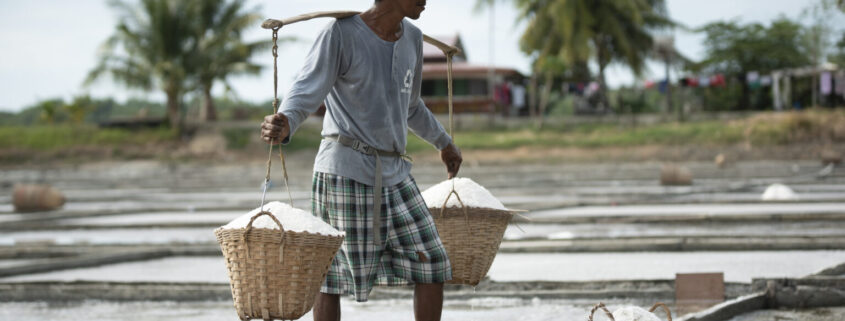Farmers back salt industry development bill, ask similar support for other rural industries
The Kilusang Magbubukid ng Pilipinas (KMP) said it supports the Salt Industry Development Bill (House Bill 8278) that the House of Representatives passed on its third and final reading last Monday.
The KMP said it once the measure becomes law, it may solve the country’s dependence on imported salt that currently stands at 90% of domestic requirements.
“As an archipelagic country with a long stretch of shoreline, it is ironic that we are a net importer of salt, with 90% of our salt consumption imported from Australia, China, New Zealand, and Thailand,” the KMP said.
“This measure, if enacted and enforced conscientiously, will help revive the dying domestic salt industry, and can give employment to the rural population, especially fisher-folk,” the group added.
The bill seeks to revitalize the salt industry, attain increased income for salt farmers and salt producers, achieve salt self-sufficiency, and become a net exporter of salt.
The said bill also aims to promote and support artisanal salt farming, as well as available non-traditional alternative methods and techniques of salt farming that allow year-round production of salt even under erratic weather patterns.
Agri Party-list Rep. Wilbert Lee, one of the principal authors of the House bill, told CNN Philippines House Bill 8278’ passage has the potential to create 3,000 to 5,000 jobs in the country’s rural and agricultural communities.
“By putting focus on the industry, we can generate thousands of jobs and lessen the burden of salt farmers, salt producers, and their families. This will also contribute to the country’s economy,” Lee said in Filipino.
The KMP said Bulacan province used to be a major salt-producing province, supplying 45% of the country’s salt requirements. However, the conversion of coastal areas and urban development in the province decimated its local salt industry, forcing traditional salt makers out of business.
“Worsening climate change has also affected local salt production as traditional salt producers use solar evaporation to extract salt in coastal areas. Likewise, the Philippines’ entry into the GATT-WTO Agreement on Agriculture in 1995, allowed the influx of cheap salt imports,” the KMP said.
Aside from the salt industry, the group said other rural industries must receive similar support for genuine agricultural development.
“[C]oconut, sugar, meat processing, dairy products, leather processing, abaca products, clothing and textiles, furniture, bamboo and rattan, fish processing, fruit, spices, and vegetable processing; agricultural by-products processing and seaweeds processing must also undergo genuine development to meet the needs of the people, local industries and the domestic economy as a whole,” the group said.
“The development of major rural industries will provide social capital towards planned and sustained rural development,” according to KMP. # (Raymund B. Villanueva)
[Featured photo: The Dasol Salt Farms in Pangasinan province is among the last thriving such operations in the Philippines. (Photo from the Pangasinan Provincial Tourism and Cultural Office: https://seepangasinan.com/places/dasol-salt-farm/]







